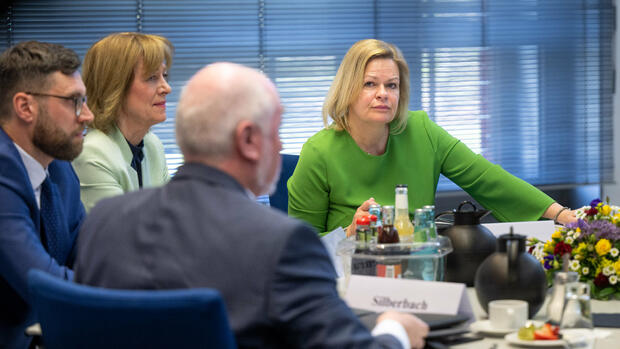The agreement in the tariff dispute provides, among other things, for tax and duty-free special payments totaling 3,000 euros in several stages.
(Photo: dpa)
Potsdam A sigh of relief for employees and consumers: after months of wrestling in the collective bargaining dispute for the public sector, the negotiating partners agreed on the highest deal in decades late on Saturday evening.
For the 2.5 million federal and local employees, this means relief in view of the high inflation. Nationwide strikes have thus been averted. Nevertheless, consumers have to prepare for warning strikes in other areas in the near future.
The most important questions and answers after the collective bargaining agreement at a glance:
Are warning strikes at airports and on the rails off the table with the agreement?
No. The only thing that has been averted with the collective bargaining agreement for the federal and local governments is open-ended strikes in the public sector – for example in garbage disposal, hospitals or city administrations. However, collective bargaining is still ongoing in other transport-related sectors. As early as this Monday, Verdi wants to paralyze the capital’s BER airport with warning strikes.
The background to this is negotiations on surcharges for night, Saturday, Sunday and public holiday work as well as regulations on paying overtime for security and service staff. Talks have been going on between Verdi and the Federal Association of Aviation Security Companies (BDLS) for some time.
>> Read here: Verdi calls for a warning strike at Berlin-Brandenburg Airport
In the railway sector, collective bargaining at Deutsche Bahn will continue on Tuesday in Fulda. There, the railway and transport union (EVG) is negotiating with the group about more money for around 180,000 railway employees. Warning strikes are also possible here at any time, which could again paralyze regional and long-distance traffic throughout the country.
Verdi wants to paralyze Berlin Airport BER on Monday
What was decided in the civil service agreement?
Among other things, the agreement provides for tax and duty-free special payments totaling 3,000 euros in several stages. EUR 1,240 of this should already flow this June, and a further EUR 220 each in the months from July to February 2024.
From March 2024 there will then be a basic amount of 200 euros gross as a wage increase and then 5.5 percent more. If no increase of 340 euros gross is achieved, the relevant increase amount should be set to this sum.
With this solution, the parties to the collective bargaining largely based themselves on the compromise proposal from the arbitration proceedings that ended a week ago. The term of the agreement is to be 24 months.
With the collective bargaining agreement for the federal and local governments, only open-ended strikes in the public sector have been averted. Warning strikes are possible at any time in the railway sector, which could once again paralyze regional and long-distance traffic across the country.
(Photo: dpa)
Who is affected?
The increase in income applies to members of thousands of different professions – including women and men who work as educators, bus drivers, employees of public baths, firefighters, nurses and geriatric nurses, administrative employees, sewage treatment workers, foresters or doctors.
It is about the income of more than 2.4 million employees of the municipal employers and 134,000 of the federal government. However, a separate collective agreement applies to the employees of the federal states, such as police officers or teachers.
What does the collective agreement mean in concrete terms for employees?
Federal Interior Minister Nancy Faeser (SPD) calculated that with this degree, a cleaning worker in the public sector would receive 360 euros or 13.3 percent more money in the future.
>> Read also: There is a turning point in collective bargaining policy – a commentary on graduation in public service
Verdi boss Frank Werneke said: “As part of this collective bargaining agreement, a nurse receives a permanent monthly pay increase of 400 euros. Or a rubbish worker for 357 euros.”
This corresponds to an increase of 13.4 percent. The trade unions mainly criticized the term of 24 months. The federal chairman of the civil servants’ association dbb, Ulrich Silberbach, said it was not possible to get more done in the municipalities.
Is the agreement coming for sure?
The Verdi trade union is now starting a member survey on the collective bargaining result. Theoretically, this could be negative, in which case renegotiation would have to take place. However, this is considered unlikely. “As a collective bargaining committee, we are promoting our members to accept the result,” said Werneke.
How expensive will it be for employers?
The agreement for the cash-strapped municipalities and cities will be a particular financial challenge. The President of the Association of Municipal Employers’ Associations, Karin Welge, spoke of the “most expensive collective agreement of all time”, which will cost the cities and municipalities around 17 billion euros. “The municipal employers went to the financial limit with this compromise,” said Welge after the agreement.
For the federal government, the total costs of the agreement for the agreed term amounted to around 4.95 billion euros. “We have accommodated the unions as much as we could still be responsible for in the difficult budgetary situation,” said Interior Minister Faeser.
More: Success in the fourth round – there is agreement in the collective bargaining dispute in the public sector
